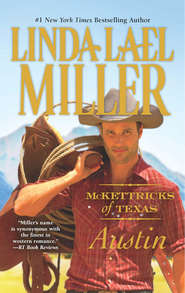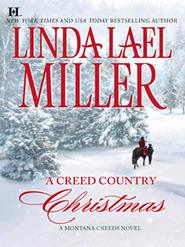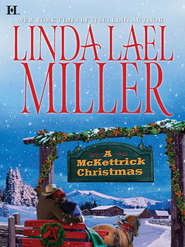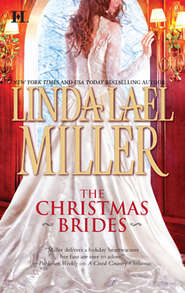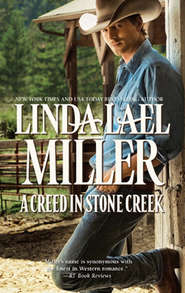По всем вопросам обращайтесь на: info@litportal.ru
(©) 2003-2024.
✖
Big Sky Wedding
Автор
Год написания книги
2018
Настройки чтения
Размер шрифта
Высота строк
Поля
Seeing a protest forming in Clare’s stormy eyes, Brylee held up both hands in a bid for silence so she could go on.
“I know you think you’re mature for your age, and you probably are, actually, but trust me, you don’t know as much about the world as you think you do.” Who does?
“You don’t trust me,” Clare accused quietly. “Or Luke, either.”
“I do trust you,” Brylee said. “You’re a very smart young lady with a good heart. But this Luke person? Maybe he’s nice and maybe he isn’t—I don’t claim to know.”
“He goes to youth group,” Clare reminded Brylee, her tone indicating that that one fact made him a saint. “At church.”
“Then why not tell your folks about him?” Brylee argued. She had to say what she thought here, but she was worried about alienating Clare. The girl had come to her in confidence, after all—would she clam up after this? Start keeping secrets that might be a lot more dangerous than plans to sit together on a bus and hold hands “and stuff” with a nineteen-year-old, whenever they weren’t being watched? Which, admittedly, with Opal on the job, would be never.
On the other hand, though, somebody had dropped the ball at some point. Was it possible that Opal and Walter didn’t know Luke’s age?
“Are you going to tell them?” Clare countered. “Mom and Dad, I mean?”
Brylee sighed. “No,” she said, wanting to strike a balance of some kind, keep the door of communication open between her and her brother’s child and do the right thing, too. What if something bad happened? She’d never be able to forget that she could have prevented whatever it was just by speaking up.
“You promise?” Clare was wheedling now. No doubt about it, the kid was a charmer and, besides, Brylee loved her.
She gave another sigh, this one heavier than the last. “I promise.”
“Good. Then I’m not telling Mom and Dad, either,” Clare said, pushing back her chair and standing up.
Snidely, finished with his kibble ration, sat nearby, watching the girl with concern.
Brylee felt a headache coming on. All her adult life she’d dreamed about being a mother, but she was learning pretty quickly that it was no job for wimps.
She remained at the table, stomach churning, for several minutes after Clare left by the back door without saying another word—not even goodbye.
Finally, Brylee left her chair, rummaged through her purse for her cell phone and scrolled through her contact list. Coming to a certain name, she thumbed the connect button and waited.
She’d given her word that she wouldn’t mention Clare and Luke’s plans for the youth group trip—which might be entirely innocent, on Clare’s side, but probably weren’t on the guy’s end—not to Walker and Casey, that is.
But she hadn’t promised not to tell Opal.
* * *
THE ELECTRICITY WAS ON—cause for celebration from Zane’s point of view. He and Slim made a quick trip to town in the truck, loaded up on grub and sundries, along with an inflatable mattress and some sheets, blankets and pillows, and promptly headed home again.
After doing some scrubbing, mostly focused on the kitchen, Zane boiled up half a package of hot dogs on the temperamental flat-top stove, and shared the meal with Slim. No sense in dirtying up a plate—he used a paper towel instead.
Easy cleanup, that was Zane’s modus operandi. He wasn’t an untidy person, especially when it came to personal grooming, but he’d depended on his California housekeeper, Cleopatra, for so long that he was spoiled.
Thinking of Cleo, Zane felt a pang of guilt. He’d given her a nice severance package—meaning he’d left her a hefty check and a note before he and Slim headed north—but otherwise, he’d basically left her high and dry. A cranky black woman with a gift for cooking that was positively cosmic in scope, she normally didn’t get along with “Hollywood types” to use her term. She’d made an exception for Zane, and now he’d gone off and left her to fend for herself in a crappy economy, in a place where integrity, like beauty, was often skin-deep.
Even in Glitzville, folks were feeling the pinch of tough times, cutting back on the luxuries. What would happen to Cleo, once she’d used up that last check, sizable though it had been?
Engaged in grim reflection, Zane was startled when his cell phone rang in the pocket of his shirt. Frowning—he was not a phone man—he checked the caller ID screen, saw his brother’s name there and grimaced even as he answered. “Hello, Landry.”
Landry, a year younger than Zane, gave credence to the changeling theory, since the two of them were so different that it was hard to believe they shared the same genetic makeup.
“We have a problem,” Landry announced.
Zane closed his eyes briefly, recovered enough to open them again and retort, “‘We’? It just so happens things are going pretty well at the moment, out here.”
“Congratulations,” Landry all but growled. “But we still have a problem, and his name is Nash.”
Nash. Their twelve-year-old half brother, the one neither of them really knew. Nash was the product of one of their feckless father’s many romantic liaisons—the boy’s mother, if Zane recalled correctly, was a former flight attendant named Barbara, who had a penchant for belly dancing, an overactive libido and a running start on a serious drinking problem. A creative baby-namer—“Zane,” for instance, and “Landry”—Jess Sutton had never been much for hands-on parenting. He liked to make kids, give them names and then move on, leaving their moms to raise them however they saw fit.
“I’m listening,” Zane said, after suppressing a sigh that seemed deeper than the well outside, the one rumbling up sluggish but clean supplies of water, now that the electricity was turned on and the pump actually worked.
“Dad just dropped him off here,” Landry said, in an exaggerated whisper that led Zane to believe the boy was within earshot and, therefore, might overhear. “I can’t take care of a kid, Zane. I’ve got a business meeting in Berlin tomorrow—get that? tomorrow—and Susan and I are on the outs. In fact, she’s leaving.” A pause. “Not that she’d be willing to help out, anyhow.”
Landry’s love life was only slightly less of a train wreck than Zane’s own had been, an uncomfortable indication that they’d inherited more from their old daddy than good teeth, fast reflexes and a passion for risk-taking. “Again?” he asked, letting a note of sarcasm slip into his voice. Susan and Landry had been married—and divorced—twice, at last count. Their marriage reminded Zane of a dizzying carnival ride; somebody was always getting on, or off.
Landry drew in a breath and let it out in a huff. Even though he was the younger of the two, he regarded himself as the responsible, reliable brother, considered Zane a loose cannon with more luck than sense. “I didn’t call so we could discuss my personal life,” Landry bit out. “The kid—Nash—needs somewhere to stay. Pronto. I was about to put him on the next flight to L.A. when it occurred to me that you might be on location someplace, pulling down ludicrous amounts of money for doing nothing special. Where are you?”
“I’m not in L.A.,” Zane said evenly. “I’m on the ranch in Montana—you know, the one we bought together a few years back, pretty much just for the hell of it?”
“What the devil are you doing there?” Landry demanded. It didn’t seem to bother him that he was pushing the envelope, given that he obviously planned on asking a favor.
A greenhorn through and through, Landry wore custom-made three-piece suits, lived in a massive penthouse condo in Chicago, employed a chauffeur and even a butler, which was just plain embarrassing, if you asked Zane, which, of course, nobody had. A complete stranger to horses and every other aspect of country life, Landry ponied up the money to pay for his half of the ranch as some kind of tax maneuver.
“I got tired of, well, just about everything,” Zane admitted, suddenly weary. The inflatable bed hadn’t held out much appeal earlier, especially since it was womanless, but by then, he’d started to think he could sleep for days, if not decades. “So I left.”
“Whatever.” Landry sighed. Dealing with Zane was an ordeal for him, what with his blatant superiority and all. “You have to take Nash,” he said. “Dad dumped him on me—evidently our dear father has to lay low for a few months until his poker buddies calm down enough to change their minds about having his knees broken. It’s you or foster care, and I think the poor kid’s had his fill of that already.”
“What about Barbara?” Zane asked moderately. “You remember her? Nash’s mother?”
“She’s out of the picture,” Landry said. His tone was flat, matter-of-fact.
Their own mother, an early casualty of Jess Sutton’s incomprehensible charm, had died a few years before of a lingering illness. Disagreements about how to care for Maddie Rose at the end remained a major sore spot between the two brothers.
“How so? Is Barbara sick? Dead?”
“She’s somewhere in India or Pakistan—one of those third-world countries—on some kind of spiritual quest,” Landry replied with disdain. “That’s Dad’s story, anyway. Suffice it to say, Barbara isn’t exactly a contender for Mother of the Year.”
“And this is my problem because...?” Zane asked, stalling. He couldn’t turn his back on his own flesh and blood and Landry knew that, damn him. Still, it was an imposition, a responsibility he wasn’t prepared to take on at this juncture, when his whole life was in transition.
“Because Nash is your brother,” Landry said, with extreme patience.
“He’s also yours,” Zane pointed out. He was already wondering what a person said to a twelve-year-old kid who’d probably been shuffled between the homes of strangers, their dad’s distant relations, the girlfriend du jour and then back through the whole cycle again. Repeatedly.
“If I don’t make this meeting in Berlin,” Landry replied, “I could lose one of my most important accounts.”
“Sucks to be you,” Zane responded mildly. “Who’s been raising this child all this time, anyway?”
“My understanding,” Landry supplied stiffly, “is that he’s been knocking around the country with Dad. Recently, that is.” His voice softened a little. “He’s not a bad kid, Zane. And he didn’t have the kind of mom who would go to bat for him, like ours did for us.”






